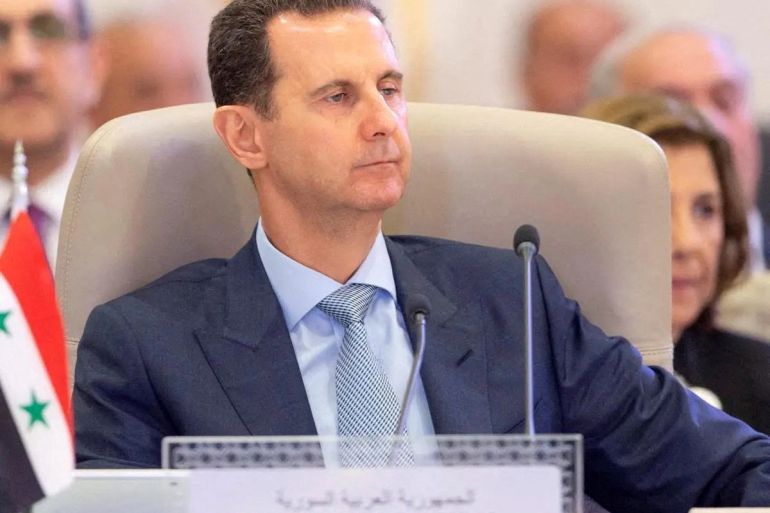The ICJ can slow down Assad’s normalisation drive
The case filed against the Syrian regime may not immediately result in justice for its victims, but it will undermine attempts to rehabilitate it.

For the most part, Syrian President Bashar al-Assad has gotten away with it. Rather than being held to account for the countless atrocities his regime has committed against civilians, the Syrian dictator has been busy reconciling with world leaders.
The Syrian civil war erupted in 2011. Since then, it is likely that every single human rights violation and international crime enshrined in international law has been perpetrated – most repeatedly. There was a time when these atrocities and the desperate plight of civilians fleeing Syria earned the world’s attention. In recent years – not so much.
It is therefore little surprise that accountability for atrocities committed in Syria has been fleeting. China, Russia and, initially, the United States all thwarted efforts to allow the International Criminal Court (ICC), which has jurisdiction over war crimes, crimes against humanity and genocide, to investigate atrocities in Syria.
There has been a steady stream of cases of European states exercising their legal powers to prosecute Syrian war criminals in their own courts, although these cannot hope to adequately tackle the widespread and systemic nature of atrocities committed in Syria. Canada, for its part, has pointedly refused to do the same – neglecting to prosecute even its own citizens who joined the Islamic State in Syria for their alleged participation in war crimes and crimes against humanity.
In this context, the announcement that Canada and the Netherlands have begun legal proceedings against Syria at the International Court of Justice (ICJ) is especially noteworthy. Ottawa has said it is seeking to hold Damascus accountable under the United Nations Convention Against Torture, “for the countless human rights violations it has inflicted on the Syrian people since 2011”.
Legal hearings are likely to begin later this summer and offer some hope that the thousands of Syrians brutalised, maimed and murdered by the Assad regime will not be forgotten.
This does not mean that Assad will find himself hauled before an international tribunal to answer for atrocity crimes. Rather, Canada and the Netherlands are going to the “world court” in an attempt to ensure that Syria complies with international law in relation to torture.
Specifically, the two want the ICJ to issue orders “to preserve and protect the rights” of Syrian civilians “under the Convention against Torture, which Syria continues to violate, and protect the lives and physical and mental integrity of individuals within Syria who are currently, or are at risk of, being subjected to torture and other cruel, inhuman or degrading treatment or punishment”.
How Damascus responds remains to be seen. It could ignore the proceedings altogether or join them in an effort to explain its position, much like Myanmar chose to do when Gambia filed a case with the ICJ in relation to the alleged genocide against the Rohingya.
The move by Canada and the Netherlands may end up being largely symbolic. But symbols matter. Justice is not always measured in outcomes; process also matters. Even with the attention of the West focused on the situation in Ukraine, the ICJ case shows that Canada and the Netherlands are firmly in the corner of the victims and survivors of the Assad regime’s violence.
That they are keeping justice for atrocities in Syria alive and are refusing to forget the thousands of civilians who have been – and continue to be – tortured in Syrian prisons is crucial.
The sad truth is that Assad has won the war in Syria. Despite more than 300,000 Syrians being killed, states are normalising relations with Damascus. Last month, the Arab League welcomed the Syrian president back with open arms, hoping to get in return his cooperation in cracking down on the drug trade and alleviating refugee crisis. His proverbial return can also be credited to his close ally, Russian President Vladimir Putin, who has long worked to break his international isolation.
Keeping the hope alive that justice will eventually catch up with Assad might not prevent his political rehabilitation, but it could slow it down. The decision to bring Syria to the ICJ over its campaign of torture should help close the political space available to those who might otherwise consider doing business with Assad.
It forces them to justify how they could do so with a man in charge of a Russian client state and mass torture machine. It also sends a message to others, like Putin, that our memory of atrocities does not come with an expiration date.
The Dutch and Canadian move at the ICJ means Assad will continue to be hounded by allegations of atrocities. It means that Syria’s victims and survivors will remain relevant in both the public consciousness and the international courtroom.
The process of achieving accountability is often winding and painfully slow. But because of efforts like Canada’s and the Netherlands’, maybe, just maybe, the space around Assad will one day shrink and his friends will grow tired of rubbing shoulders with a war criminal par excellence. When that day comes, justice for Syria will move from a mirage to a distinct possibility.
The views expressed in this article are the author’s own and do not necessarily reflect Al Jazeera’s editorial stance.
